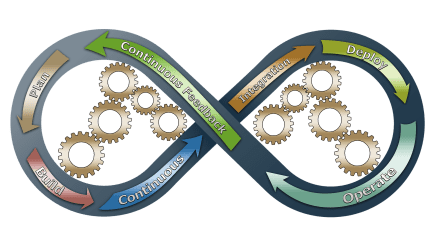Was ist DevOps?

DevOps is a culture-shifting methodology that can streamline the processes between software engineering and IT teams. DevOps is the best way to improve communication and efficiency between traditionally separate departments. By combining important practices like Agile, continuous delivery and automation into one strategic development plan, DevOps provides a comprehensive solution.
What is DevOps?
If we don't release this software soon, our competition will beat us to market and we'll lose our chance to dominate the industry. Sadly, your company's product, or their software, updates frequently. Quality assurance in your company works rather slowly, because of protocol. And when the product then finally launches, it is full of bugs and breaks apart as fast as it was online.
DevOps, a combination of the words “development” and “operations,” is a culture-shifting software development methodology that un-silos the engineering department that writes the code and the operations and IT department that implements it.
BENEFITS OF DEVOPS
- Faster time to market
- Increased inter-team communication
- Heightened transparency throughout development process
- A unified and shared set of team goals
- Finding bugs is easier and faster to correct
- Increased user satisfaction
- A more flexible team
Before DevOps, engineers and operations teams were separate entities. Because their objectives competed with each other, their paths rarely crossed. The silo between two teams led to longer deploy times and failed product launches. Inefficiency and various issues plagued the old software development methodology.
DevOps is a process that automates the communication between software development and IT operations teams. Instead, DevOps is a cultural change that encourages communication and collaboration between key stakeholders. The purpose of DevOps is to render the development process more effective so that businesses can introduce new product versions and enhancements on a regular basis without adversely impacting quality. These objectives can be met by adhering to the five CALMS principles of DevOps.
DevOps Principles
DevOps Principles: The CALMS Framework
Jez Humble, a DevOps pioneer, coined the CALMS framework to determine how successful an organization would be at adopting DevOps. To achieve DevOps success, companies must be able to accommodate for five specific principles:
Culture
In order for companies to adopt DevOps, they must first establish a culture of collaboration between engineers and IT operations professionals. By working together, instead of competing against one another, these professionals can reach certain metrics or achieve certain goals. By aligning the goals of each group, both teams are able to work together more efficiently in quality assurance testing. By working together, teams can quickly identify bugs, focus on solutions and implement quick fixes, all within a few days (rather than a few months or not at all).
Automation
Automation plays an important role in the DevOps methodology. By automating repetitive and predictable processes, work is accelerated and reliable systems are created. Continuous Delivery (CD) is a significant part of the automation process. CD essentially means that engineering and operations teams are continuously testing code and deploying on a faster basis. Teams rely on a slew of CD softwares to help speed up the process. Instead of one gigantic deployment that takes months to deploy, continuous delivery relies on smaller, yet more efficient deployments. By reducing the risk involved, this allows for development teams to stay on top of any necessary fixes.
Lean
The term "lean" in DevOps refers to the removal of unnecessary processes so that only the essential steps remain. Teams should have an agile-first mentality when crafting a product, meaning that they put out a simple product first and make continuous improvements to it in order to craft a perfect product a few months or years down the road. The advantage of a lean approach to software development is that it allows teams to make changes quickly, without incurring the greater risk or waste associated with traditional methods.
Measurement
Without metrics, it is difficult to measure improvements. DevOps uses a variety of tools and technologies to measure performance and identify achievable KPIs. Some of the measurements commonly taken in a DevOps setting are: How many tickets were being pushed per release? How many bugs did we find and fix? How many users were affected by the bugs? What is our response time? Questions like those help the team keep up with the state of the software and keep them up-to-date on how they progress in their software development progress.
Sharing
By sharing responsibilities, engineers and operations teams can work together to achieve a common goal. This sense of shared purpose helps to break down barriers between teams and creates a culture of collaboration. Sharing is an important aspect of DevOps because it helps to fill in the gaps of the development process and ensures that all teams take a hands-on approach from start to finish.
DevOps Tools
The DevOps process involves the integration of different technologies to help automate processes and improve the quality of the final product. Here are some of the popular tools that companies use in their DevOps tech stack:
Git & GitHub
Git is a source code management tool that allows for full transparency and clarity into the development process. Git is an excellent tool for managing source code versions, allowing for easy experimentation and merging of new features when ready to release. GitHub provides access to code repositories that are created with Git, allowing a wide range of engineers to collaborate on projects.
Docker
Docker has become one of the most popular DevOps tools because it simplifies containerization. What is containerization? In containerization, each “container” includes all of the elements needed to create a product from start to finish. The traditional method of software development involved code being transferred from a specific computing environment to a virtual machine or operating system. Containerization is a process of packaging code, with the various files, libraries and other tools that require a product to run, into a standalone unit.
Jenkins
Jenkins provides teams with the ability to fully customize their Continuous Integration/Continuous Delivery (CI/CD). The flexibility of Jenkins allows for a variety of options which enable development teams to not only build the product, but also smoke test it, in a way that makes the team feel comfortable and efficient. Furthermore, Jenkins holds another desirable feature in that it maintains more than 1,000 plugins which integrate with almost every other mainstream DevOps tool.
Kubernetes
Kubernetes is a containerization tool designed to automate the management of hundreds of containers at one time, making it useful for large DevOps systems. For example, rather than deploying hundreds of containers onto the same machine manually, Kubernetes permits automating the deployment of containers to avert overburdening systems with too many deployments simultaneously.





















